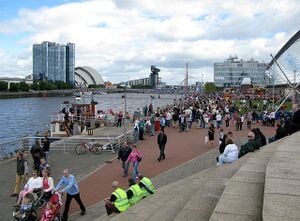The aim of this page is to recognise, celebrate and encourage the self-empowerment of community agency networks (CANs) and community groups across Glasgow.


 There is a rage for urban swimming in Europe right now - in the Seine for the French Olympics, but in Copenhagen, Glasgow and London too, Daily Alternative (Jul 17, 2024)
There is a rage for urban swimming in Europe right now - in the Seine for the French Olympics, but in Copenhagen, Glasgow and London too, Daily Alternative (Jul 17, 2024)  "Is that a doughnut or a meringue?" No, you were right the first time... Doughnut Economics makes its arrival in Glasgow, The Daily Alternative (Nov 26, 2023)
"Is that a doughnut or a meringue?" No, you were right the first time... Doughnut Economics makes its arrival in Glasgow, The Daily Alternative (Nov 26, 2023)  A community food supply, wickedleeks.riverford.co.uk (Jul 31, 2023) — Urban farms are bypassing supermarkets to create their own local food systems and connect communities. Robbie Armstrong
A community food supply, wickedleeks.riverford.co.uk (Jul 31, 2023) — Urban farms are bypassing supermarkets to create their own local food systems and connect communities. Robbie Armstrong
This page is the beginnings of a portal for Glasgow community action, focuses on community action topics. Other Glasgow pages include Community resources Glasgow, and Glasgow news.
Networks and sustainability initiatives[edit | edit source]
South Seeds[edit | edit source]
- South Seeds, community organisation based in the South Central area of Glasgow, working in partnership with residents and organisations within the local community to help improve the look and feel of the area and enable Southsiders to lead more sustainable lives .
Centre for Human Ecology[edit | edit source]
The Centre for Human Ecology is an independent academic institute based in Glasgow, Scotland. It was founded in 1972 by Conrad Hal Waddington at the University of Edinburgh.
- Centre for Human Ecology, Education and action for head, heart and hand, added 13:27, 26 October 2021 (UTC)
Other groups and links[edit | edit source]
- Friends of the Earth Glasgow on facebook.com, added 14:10, 27 November 2023 (UTC)
- Glasgow Caledonian University Sustainability, on facebook
Climate action[edit | edit source]
The 2021 United Nations Climate Change Conference, more commonly referred to as COP26, was the 26th United Nations Climate Change conference, held at the SEC Centre in Glasgow, Scotland, United Kingdom, from 31 October to 13 November 2021.
In the midst of the conference, on 6 November 2021, a march against inadequate action at the conference, as well as for other climate change-related issues, became the largest protest in Glasgow since anti-Iraq War marches in 2003. Additional rallies took place in 100 other countries.
Cycling activism[edit | edit source]
- Bike for Refugees Scotland, Glasgow and Edinburgh Community Hubs. added 15:59, 7 November 2023 (UTC)
Ecological restoration[edit | edit source]
- Blue Green Glasgow, community interest company restoring post-industrial land in Glasgow by building wetland, or blue-green, ecosystems for climate adaptation, engaging communities, and the creation of sustainable jobs. Phase-1 of The Govan Wetlands Project uses a wetland ecosystem to capture carbon, rehabilitate soils, and support wildlife. The Govan Wetlands site will feature regenerative farming practices that put nature at the heart of food production and the carbon draw-down as wetlands capture on average 30-times more carbon than rainforests. The project was developed in partnership with the University of Strathclyde, the University of Edinburgh, Positive BioCarbon, Plantimate, GE Current, and Seawater Solutions. The Govan Wetlands project is a part of a wider regeneration of the historic Govan Shipyards which is to include the development of a new sustainable neighbourhood, historic preservation initiatives, and the revitalisation of activities on this long-abandoned site in the heart of Glasgow.,[1] added 16:59, 4 November 2021 (UTC)
Arts, sport and culture[edit | edit source]
- GalGael, working community based in Glasgow. The community works together on demanding common tasks, such as building boats that demonstrate ways of living with more humanity in our times. added 13:42, 26 October 2021 (UTC)
Community safety[edit | edit source]
Food activism[edit | edit source]
- Glasgow Community Food Network, added 17:49, 5 December 2022 (UTC)
- Locavore, added 14:08, 9 November 2021 (UTC)
Towards sustainable economies[edit | edit source]
- Glasgow Doughnut, added 18:20, 30 November 2023 (UTC)
Reduce, reuse, repair and recycle[edit | edit source]
- Repair Café Glasgow, monthly repair café, last Saturday each month, added 15:44, 8 July 2024 (UTC)
About Glasgow[edit | edit source]
Glasgow (UK: GLA(H)Z-goh, GLA(H)SS-) is the most populous city in Scotland, located on the banks of the River Clyde in west central Scotland. The city is the third-most populous city in the United Kingdom and the 27th-most populous city in Europe. In 2022, it had an estimated population as a defined locality of632,350 and anchored an urban settlement of1,028,220. The economy of Glasgow is the largest of any city or region in Scotland's economy, and the cities economic strength is reflected in its membership of the Core Cities Group.
Glasgow grew from a small rural settlement close to Glasgow Cathedral and descending to the River Clyde to become the largest seaport in Scotland, and tenth largest by tonnage in Britain. Expanding from the medieval bishopric and episcopal burgh (subsequently royal burgh), and the later establishment of the University of Glasgow in the 15th century, it became a major centre of the Scottish Enlightenment in the 18th century. From the 18th century onwards, the city also grew as one of Britain's main hubs of oceanic trade with North America and the West Indies; soon followed by the Orient, India, and China. With the onset of the Industrial Revolution, the population and economy of Glasgow and the surrounding region expanded rapidly to become one of the world's pre-eminent centres of chemicals, textiles and engineering; most notably in the shipbuilding and marine engineering industry, which produced many innovative and famous vessels. Glasgow was the "Second City of the British Empire" for much of the Victorian and Edwardian eras.
Over 1,000,000 people live in the Greater Glasgow contiguous urban area, while the wider Glasgow City Region is home to over 1,800,000 people, equating to around 33% of Scotland's population.[5] The city has one of the highest densities of any locality in Scotland at 4,023/km2. W
References




